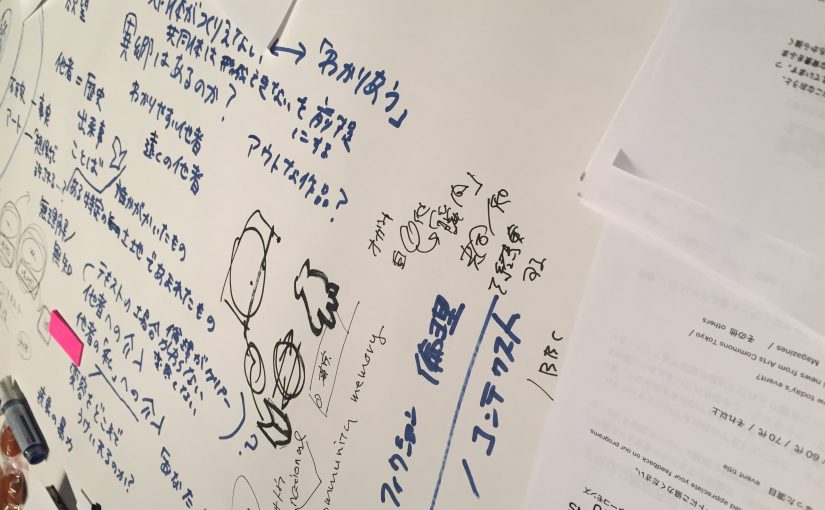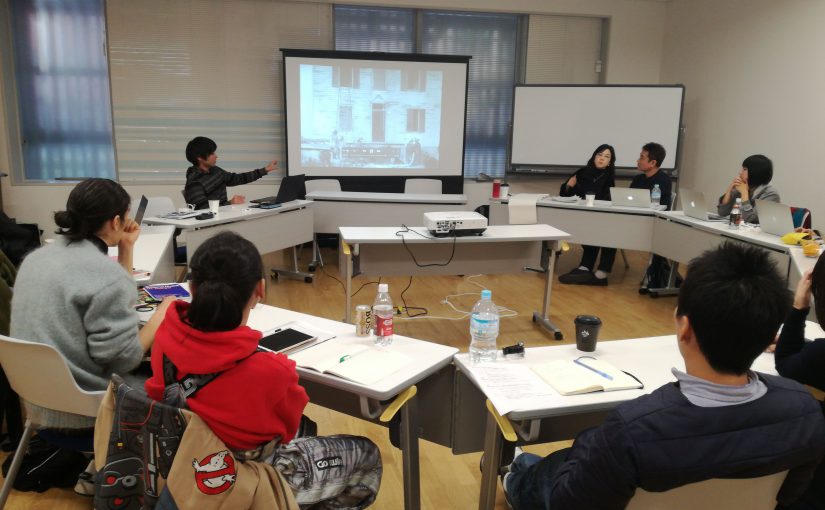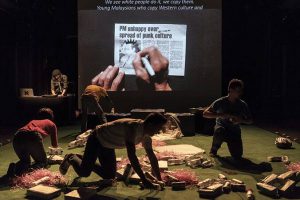マーク・テ 分散する思考、未来像/「バージョン2020:マレーシアの未来完成図 第三章」
24/01/2018Sorry, this entry is only available in Japanese.
Movements Toward Active Spectatorship
创造亚洲的观众空间 능동적 관객을 위한 움직임 アジアの観客空間をつくる
 SCENE/ASIA
SCENE/ASIA
In the past few years, we have witnessed an upsurge of political movements demanding functional democracy in different Asian countries. The question that we pose for the first two years of Scene / Asia project is: “Is democracy, as we know it today, really the best political solution in Asian countries?” Together with curated artworks from five different Asian regions, the Scene / Asia team will delve deeply into this topic.



Sorry, this entry is only available in Japanese.
Sorry, this entry is only available in 簡体字.
Sorry, this entry is only available in Japanese.
Cambodia is a country symbolized by its glorious past and wounded present. A prevailing stereotype of Cambodia by the West and even within the Southeast Asia mediascape is that of a “post-communist” country ruled by a former Khmer Rouge leader and dominated by NGOs. Alongside the prevalent international image of genocide, refugees, poverty, and war, global media has often associated Cambodia to the Angkor Wat—thanks to the Hollywood Blockbuster Lara Croft Tomb Raider: The Cradle of Life (2003) and its leading actress Angelina Jolie’s constantly revisits due to her Cambodian adopted son. These two dominant, but somehow disjointed, narratives have engulfed the entangled history of state-building processes in the broader context of regional warfare in the post-World War II era. Since 1953, after the gradual pullout of the Japanese military force, Cambodia finally gained its independence from the French. As a former French protectorate, King Norodom Sihanouk’s power was sustained through the constitutional monarchy with an elected parliamentary form of government. Even though Sihanouk had decided to abdicate the throne in 1955, with the help of his political party Sangkum (which means “community of the common people”), he won the general election, officially becoming the prime minister of Cambodia. Regardless of the public’s reception of Sihanouk as a god-king and that he won governmental power through an official election process, Sihanouk was overthrown by a coup d’état in 1970 that subsequently led to his support of the Khmer Rouge and the inevitable civil war in 1975. Democratic Kampuchea was then established as the new government of Cambodia. From April 1975 to January 1979, the Khmer Rouge, under the leadership of Pol Pot, committed one of the most heinous massacres in modern history—the Cambodian genocide. As a result of Pol Pot’s political aspiration to return to Year Zero, a massive number … Continue reading The University of Memory: Cambodia Reflections
Sorry, this entry is only available in Japanese.
Democracy as a conundrum of colonialism has been re-articulated in various historical contexts. In the 19th century, French poet Arthur Rimbaud writes: “Let’s drink to sodden and spicy places! –that promote the most monstrous industrial or military exploitation.”*1 His poem “Démocratie,” and especially its title, was an attempt to condemn an atrocity committed in the people’s name when it was actually masking “a genuinely bourgeois regime,” and the inauguration of colonial power.*2 In the contemporary context of India as a postcolonial nation-state, Partha Chatterjee, the eminent scholar of the Subaltern Studies Group, argues, “The framework of global modernity will,…inevitably structure the world according to a pattern that is profoundly colonial; the framework of democracy, on the other hand, will pronounce modernity itself as inappropriate and deeply flawed.”*3 Looking at the democratic movements in Taiwan after the lifting of martial law, the leading intellectual figure Kuan-Hsing Chen proposes a “de-Cold War” schema, in which he argues that these democratic movements are the cultural results of Taiwan’s engagement with American imperialism, which was characterized by its right-leaning, anticommunist tendencies and pro-American agenda.*4 The origin of democracy, as examined by Jacques Rancière, also was constituted upon “a nature order of things according to which assemblies of” those, who are entitled to exercise their governing power over those who has been categorized as governed.*5 Whether or not Taiwan’s Sunflower Student Movement, which occurred from March to April 2014, could be claimed successful as the defeat of the pro-unification Kuomintang and the overwhelming disillusionment with the current ruling party, the People’s Progressive Party, the romanticized discourse of democratic movements inevitably lost its relevance, as evidenced especially by the ideological violence of populism and the gradually carnivalized mass mobilizations in the era of the collapsing welfare state. Having in mind Antonio Gramsci’s proposal for countering hegemony, … Continue reading Decolonizing Democracy in Time
Sorry, this entry is only available in Japanese, 簡体字 and 繁体字.
On 20 – 21 March, Scene/Asia Annual Event 2017 will be held at Hong Kong Arts Centre. The event will be consisted of tripartite structure; with, first, an Asian Artist Interview Marathon with five artists (from Malaysia, Singapore, Hong Kong, Japan and Korea); second, a key-note interview session with Taiwanese visionary Chen Chieh-Jen; and, three, our annual symposium focusing on the topic of how Asian democracies, which have been distorted and distributed from the power of the ‘other’, are being addressed and articulated by contemporary artists. Free admission (booking required).Free admission (booking required). Date: Monday, 20 March 2017 13:30 〜 Tuesday 21 March 13:00〜 (Registration starts 30 minutes before on both days) Venue: Hong Kong Arts Centre McAulay Studio (2 Harbour Road, Wan Chai, Hong Kong) Participating Artists: Fahmi Reza, Ho Rui An, Candace Chong Mui-ngam, Hansol Yoon, Akira Takayama (in the order of the interview session) / Chen Chie-Jen Please book your seat through this link. Monday, 20 March 2017 Asian Artist Interview Marathon at McAulay Studio Hong Kong Arts Centre ————————–————————–——————- 13:00 -13:30 Registration and Check-in open for audience 13:30 – 13:40 Introduction and Opening Remark for Day 1 13:40 – 14:40 Interview and Q&A Session with Fahmi Reza (moderator Kyoko Iwaki) 14:40 – 15:40 Interview and Q&A Session with Ho Rui An (moderator Kenneth Tay) 15:40 – 16:00 Coffee Break 16:00 – 17:00 Interview and Q&A Session with a Candace Chong Mui-Ngam (moderator Ruijun Shen) 17:00 – 18:00 Interview and Q&A Session with Hansol Yoon (moderator Kim Juyeon) 18:00 – 19:10 Interview and Q&A Session with Akira Takayama (moderator Chiaki Soma) 19:10 – 19:20 Closing Remarks (All interviews will be conducted in English) Tuesday, 21 March 2017 Key Note Interview Session with Chen Chie-Jen and Scene/Asia Annual Symposium at McAulay Studio ————————–————————–——————- 13:00 – 13:10 Introduction … Continue reading Scene/Asia Annual Event 2017
Given the history of its governance up to this present moment, authoritarian control has evolved from Singapore’s agonized past to its manifest destiny. The consequences of power and the foreclosure of opportunities and spaces for freer embodied expressions shape cultural productions and its receptions. At the same time, questions about the difficulties and complexities of artmaking become the signal moment in every other engagement by artists from Singapore with their audiences abroad. Artists are transformed from makers and creators into country representatives called to account for the spectre haunting the island, the spectre of censorship. While the questions are understandable, even inevitable, the dominant influence of state power seems to produce only binary expectations of possible responses; they are either collaborationist or oppositional, either a socially or politically-oriented artistic practice or an art that submits itself to visual or dramatic pleasure. As though the preponderous agenda-set by the state limits the artists’ and audiences’ imagination on how artists can address, or embody the impact of the political power for and on those who inhabit this place. Bunny by Daniel Kok and Luke George The dancer and choreographer Daniel Kok, in close collaboration with the Australian artist Luke George, spent time together in Japan and separately afterwards, learning the art of shibari, or Japanese-style tight binding. To this central repertoire of erotic bondage, they added nautical styles of rope knotting and macrame weaves, among other rope manipulation techniques to create a two-hour long bondage-installation involving the binding of objects, their own bodies as well as the audiences’. The production was first developed in Beppu Project Japan, previewed at the Substation and premiered at Campbelltown Arts Center, all 2015, before embarking on an ambitous tour in 2016 that saw performances in TFAM Yokohama, Abrons Art Center New York, and OzAsia Festival Adelaide. … Continue reading In Other Guises: Art and Politics in Singapore
If Francis Fukuyama and his ilk were to be believed, the era of -isms was supposed to be over and we would all be living in a paradise of liberal democracy. Things, as we now know, didn’t quite turn out that way. Like a zombie hydra, the -ism is back with a vengeance. Faced with all these variant extremes clashing together violently on the screens of our televisions and mobile devices, what can ordinary citizens do? I would like to suggest we take some hope in the renewed interest in the commons that we are seeing around the globe. The commons refers to the shared resources accessible to each and every member of society, whether that be digital resources like the Internet, cultural and intellectual assets like books and libraries, or natural resources such as water, air and land. The Occupy movement sprung up around the world in September 2011 in protest at the way the finance industry and banks had been bailed out with taxpayers’ money, despite having destroyed the global economy, and allowed to continue their rule over “the 99%”. They spoke to the new anger of the Millennials, who were waking up to the realisation that they would never experience anything like the future comforts that their parents’ generation enjoyed. Occupy started in New York, but the people who took over Zuccotti Park were far from the first of their breed. A short glance at history will reveal countless earlier examples. In fact, according to thinkers like David Harvey and Henri Lefebvre, the most vital and effective use of the commons can be found in cities – and these can become revolutionary movements. But Tokyo is not like most cities. Why is the commons in Tokyo so elusive? One tempting answer perhaps lies in what Donald Richie … Continue reading In Search of a New Tokyo Commons
The debate about what the arts contribute to society may well have picked up pace in the UK in the second half of the 1990s under the New Labour government with the aim of securing more public funding, but in Japan it was the Fukushima nuclear disaster, which was sparked by the Great East Japan Earthquake in 2011, that proved a major opportunity to share this inquiry. While in the former case, the debate gave a boost to socially engaged art dealing with concrete issues in society, for the latter an urgent feeling of helplessness propelled not only artists but many people working in the arts to examine social problems more than ever before. In fact, Japan was already engulfed by a wide range of social problems, including depopulation in rural regions, an aging population combined with a declining birth rate, the economic crisis, energy problems, and irregular employment. But the exposure to such an immense disaster led to works of art that both introspectively attempted to locate these social problems and examine our society as well as works of art that interpreted social problems and re-examined them historically, in addition to endeavors to uncover social connections in the art of the past. On the other hand, we have also seen the relaxation of the ban against arms exports under Yoshihiko Noda’s Democratic Party of Japan government and the nationalization of the disputed Senkaku Islands (Diaoyutai Islands), as well as, especially after Shinzo Abe returned to power, a shift further to the right in regards to foreign and security policy, resulting in a conspicuous rise in nationalism. Conservatives have been the constant critics of postwar democracy in Japan, and the revival of things such as the family and sense of community that they say have been lost due to postwar … Continue reading Art that Shapes Dissensus, and Its Experimentation and Demonstration
On February 16th, 2016, the first annual symposium of Scene/Asia, which launched last year, was held at SHIBAURA HOUSE in Tokyo. The theme of the symposium was “Trans-forming Scenes: Reconstituting Democracy.” Kyoko Iwaki, the chief director of the project, gave an opening speech, explaining the theme for 2015-2016. From the very beginning, the task of Scene/Asia was to create a platform that allows us to collectively view the ongoing situation of the art world in Asia, with Asian colleagues. The keyword “democracy” appeared through a series of discussions. The topic did not appear all of a sudden, but gradually materialized as participants discussed various events and issues across Asia. The topic suggests the project’s focus on dissecting the imported western concept of “democracy,” and to reinterpret and re-implement the term that fits the lives in multiple places in Asia. The theme, “transforming scenes,” suggests that the whole picture of Asia is never a fixed picture but consists of countless individual small shifts. The transformation, so to speak, is not a revolutionary change in which people uniformly move towards one direction. Rather, the focus of Scene/Asia is on small transformations, which eventually leads to a big flow. In addition, the project does not take a canonical academic approach centering on literary analysis, but will travel across Asia intensively conducting fieldwork-based research. In contrast to Okakura Tenshin, Scene/Asia does not assume that “Asia is one,” especially when it comes to analyzing how capitalism and democracy are implemented in respective regions. It will rephrase, reconsider, and reinterpret Asia. One important thing to note is that it has a partner from China, where, of course, democratic political system does not exist. Indeed, it may not be correct to include China even within the frame of capitalist “democracy.” However, when we dissect democracy and … Continue reading Scene/Asia Annual Symposium 2016: Trans-forming Scenes: Reconstituting Democracy